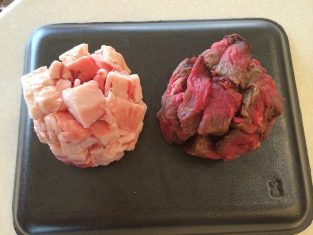On the path of weight loss you expect a lot of underwater boulders, rocks and stones, which you learn from this text. In the process of losing weight is the most important – your daily comfort, as this approach to life and nutrition, starting to stick which you will inevitably change. Be caring, kind, neat, attentive to himself in this way.

Energy balance and calories
The first and most important thing to study and understand – is a simple and intuitive law of energy balance. Words it sounds so: "eat more calories than you spend, gain weight, less to lose weight". It does not matter what products or dishes were recruited calories. Also not critical, and those, what was the connection gene proteins, fats and carbohydrates. Each person has its own intake of calories (depending on body size and activity) – an approximate figure will give the calculator "Calculate calories" under the logo Zornica. If you want to lose weight need joints to eat 10-20% less of this norm. It's all, the rest is secondary. Similar experiments conducted in different years and the result was the same: all participants lost weight during the calorie deficit, regardless of food, which they did. Decided total calorie deficit. There was even one strange investigation where a calorie deficit not losing weight, but then it turned out that everything is in order — the subjects just lied.
It is possible to eat even only one fast food restaurant, but with a caloric deficit and still lose weight?! Yes, that's right! Such an experiment is also conducted (and time). One of the most famous: high school teacher John Cisna in the school of experiment in natural science decided to eat 3 months exclusively in fast food. During these 3 months, John has lost 17 kg and it is so impressive that we decided to extend the experiment for another 3 months. A similar experiment with fast food let University student Jared Fogle earned by becoming the face of the company . He weighed 193 kg at growth of 185 cm, But one day his life changed after he started to eat a deficit of calories. He invented a diet with a deficit: 18-inch Turkey sandwich for lunch, a sandwich with vegetables for dinner + one jar of a circle and a packet of baked potato chips. For the first 3 months he lost 42 kg, a year – on 111 kg, thanks to this diet – with a deficit of calories. For weight loss (not health) matters how much you eat (calories), not what it is. Jared Vogl lost weight from 193 to 82 kg per year supply deficit of calories.

Why not starve for weight loss
The first thing that comes to mind after reviewing the law of energy balance "the bigger the deficit, the more weight loss". That is, if you can't eat at all, or there are very few (300-500 kcal per day), it is possible to lose weight quickly. Of course, it will give short-term effect, but in the end will make it worse: a rollback is inevitable, because people simply can not long to eat below your baseline metabolism. (for the average woman 30 years old, height 160 cm and weight 60 kg – the basic metabolic rate of about 1,300 kcal per day and the total rate is about 2000 kcal/day). Here is very useful to recall the famous Minnesota "starvation" experiment 1944, when under the supervision of scientists a group of people voluntarily sat in the long diet calorie just below their base metabolic rate (the average caloric intake of the participants in the hungry phase amounted to 1,570 kcal per day for six months). Axis what happened to the subjects and will happen to anyone who dare a long time to eat below the level of their basic metabolism:
- connection appeared apathy, decreased interest in the discussions before hot for them topics;
- increased irritability and aggressiveness, frequent outbursts of anger;
- decreased average heart rate (up to fasting the average heart rate was 55 beats per minute, and after only 35, the organism has passed in the power saving mode);
- the frequency of emptying the rectum has become extremely rare – once a week;
- blood volume decreased by 10%, the size of the heart diminished;
- connection appeared swelling of the face, the knees and ankles, some rough skin;
- connection appeared dizziness, muscle pain, ringing in the ears, worsened coordination;
- libido decreased and then completely disappeared, the testis began to produce fewer hormones, sperm count decreased, they became less mobile;
- the connection had problems with mental health Yam: scientists have discovered through tests many participants hypochondria, depression, hysteria.

If you long to eat a deficit of calories below your basic metabolic rate, over time you can hook up to appear the same symptoms as that of the participants of the experiment. Almost always the consequences of a failure after the famine are: a set of even more weight than before fasting, usually due to fatty tissue, the body will begin to more actively to stock up, as soon as caloric intake rises. And the axis m Azov tissue during fasting, on the contrary burned pretty quickly. This effect is called yo-yo: as a result of every stage of hunger in the body less and less m asovih tissue and more fat. This way you can get yourself into a metabolic dead end, out of which would be long and painful. While hungry diets weight loss happens largely due to loss of lymphoid tissue and m asovih fiber, not fat, which does not give up and goes in last. Weight loss during fasting, of course, is obvious, but this loss will be temporary, and will almost certainly return even greater harm and weight. Starvation diet almost always ends the same way: a food stall. First, because it is impossible dramatically and forever sit on 500-700 (and even 1200-1500) calories a day, and secondly, it will contribute to developing the background of loss of nutrients depression. That's why the advice of scientists and experts: to lose weight is important, where possible, gradually, the deficit of not more than 20% of calories. Such a strategy can give a stable result.
Diet with restriction of carbohydrates. Water retention
In a huge number of popular diets have one common symptom – reducing the consumption of carbohydrates. This is a very important detail, since in addition to calorie balance dictates including storage or fat burning, body weight can change due to the retained water. So the axis: carbohydrates in the body hold water. Not fat, but just water. In an average-sized person there is an operational energy reserve in the form of about 0.5 kg of carbohydrate (a substance called glycogen, in the liver, m muscle, blood, and important for the sustenance and immunity). But an important detail: every 1 gram of carbs holds 3 grams of water.

Therefore, if you Deplete glycogen stores (like not eating carbs), the body is able to very quickly, literally within 1-2 days to lose 1-2 kg due to declining reserves of carbohydrates and, therefore, more "plum" of water that the carbohydrate reserves when communicating. (More on how this works we have described in the text Lyle McDonald: Rule 3500 kcal = 0.5 kg). This loss will have relation to fat reduction, but we will see on the scales. Once again you will begin to consume carbohydrates (connection eat spaghetti, rice, buckwheat, bread) — liquid back in your body. And that's fine. Who recommends to 50-55% of calories from carbohydrates is good. However, a quick effect, which is given in the first days of any diet with a calorie restricted, supports the myth of his miraculous efficiency. Ale, let's look just a step further and list the cons:
- By limiting carbohydrates is lost is not body fat, and depleted operational reserves of energy (glycogen) and is associated by them water. Your body becomes more beautiful and proportional, it's just getting 1-2 kg less liquid.
- This is a temporary phenomenon – until the first good portion of carbohydrates. Are you ready for more never eat carbs (completely give up bread, pasta, rice, buckwheat, sweet just)?
- This is a limited phenomenon of glycogen in the body only up to 0.5 kg, and mean more than 1-2 kg on the method "merge" will not work. Therefore, on this figure, the vast majority of cases, the "diet" ends.
- It can impair mood, brain activity (carbohydrates – the main fuel of the brain), can cause irritability, affect the immune system.
And the axis what the undoubted advantages of limiting carbohydrates:
- Carbohydrates are delicious and they are easy to sort out calorie consumption. Restricting carbs allows you to look carefully at your diet and generally facilitates the control of incoming calories.
Conclusion: it makes no sense to restrict all carbohydrates (except what is useful to eat less simple sugars), it is better to restrict the calories in their framework. It makes no sense to drain the water.
Overview of diets and how they work
"The Kremlin diet"

The bottom line: the Axis that writing compilers: a carbohydrate is your enemy, it is from carbohydrates to fat. Don't eat carbs and you will lose weight. Dieting can only protein and a little bit of fatty foods: meat, fish, eggs, vegetables and fruits. Then, after the first stages of the diet, allowed to add some carbohydrates. How does actually: due to the depletion of glycogen stores, in the first days of the diet you will be weight loss due to water drainage. On top of the loss of water on the Kremlin diet the possible loss of live weight (soft muscle and fat) with a deficit of kcal. Every 7-8 thousand kcal = plus/minus 1 kg (depending on enterprises dalisa norm for these 7-8 thousand calories or Vice versa — ate with the same deficit). What to do: eat carbs and don't worry about anything. Consume 10-20% less of their calories + do fiznagruzki, not to lose m Yazov fabric.
Kefir diet
The bottom line: a little meat, vegetables, lots of yogurt. Kefir can drink when they want and how they want. How does actually: (as well as all the previous ones), water loss of 1-2 kg in the first days due to the reduction of carbs (meat, vegetables, and yogurt it is very little). The loss of 1 kg of meat muscle and fat in every 7-8 thousand kcal deficit (or a set of 1 kg of fat if you go with the m the jar and yogurt to consume in excess of your normal calories). What to do: eat meat (or any food), drink kefir (or any other moisture) and don't worry about anything. Consume 10-20% less of their calories + do fiznagruzki, not to lose m Yazov fabric.
How to lose weight: practice
Now, when you are deeply familiar with the scientifically sound theory of weight loss and psychological pitfalls, we will give several more practical chapters on your journey of weight loss (limiting caloric intake). The experts write that only 10% of those who lose weight manage to keep the result for a long time. Another source of writing that as much as 95% of the lost weight back within 1-5 years. We hope that if you read all that was written before this Chapter, you will greatly increase your chances to get into the successful 5%.
How do you know your calorie consumption. The subtleties and nuances

In 1990, the formula was designed Mifflin-San Jeora, which is considered one of the most simple and accurate to calculate energy needs. This formula considers the calculator. Axis example of calculation of calories: an easier way to calculate your total daily energy expenditure is to multiply the body weight 30-35 kcal. The more active a person is, the more you need to focus on the upper bound. Women need to pay more attention to the lower bound. For example, the estimated calorie consumption for females: 60 kg * 32 (moderately trained) = 1920 calories.
How to start a weight loss and how not to quit.
Having read to this Chapter VI no one important first step. Come back to this text each time you are experiencing difficulties and looking for answers. We recall the most important, why you should start losing weight and as if we were acting in this case. Axis essential principles that will help you achieve long-term success:
- Realize that the changes that you are going to implement in my life forever. How you look is not only genetics but also a result of your life style, how and what you eat, what you do. If changes in habits will be temporary, the results weight loss will also be temporary.
- Proceed as slowly as possible, the maximum in small steps. Don't force yourself to change your life completely together – because, most likely, it will not work. On the enthusiasm and willpower to go for a long time will not work. Enter no more than 1 new habit per month. Start, for example, in order to observe how you eat: just get used to counting calories and understanding how many kcal approximately ing connections ate for the day. Then gradually introduce new habits: for example, buy yourself a couple of pounds of vegetables and fruit every couple of days (or at least a couple times a week). Do not act abruptly, enter this mode to gradually and comfortably – it's forever, so there's no rush.
- Be very careful and sensitive to him. Do not forget to encourage yourself for good habits, to give yourself relief (treat yourself to favorite foods, even if they don't seem "healthy"), remember that 10-20% of the diet even is recommended to make of the conventionally "bad" foods and generally make your diet that you really love. Because these food rules with you now forever – may they be as comfortable as possible.
- Exercise. This ensures that you will be feeling better and will lose weight mainly fat reserves, but not th gen. It will choose something to their liking. Even regular walking is a very useful exercise enough to stay on it.
- Put your healthy lifestyle a high priority. Try to raise the importance of training in your schedule to the highest priority. Ultimately, this will positively affect work and family th.
- Derive pleasure from the process. This is the most important part of the process. We believe that it is better to lose weight easy, enjoyable and feel this way mostly pleasant emotions.

Thank you for reading and for your desire! Will succeed! Take care of yourself!














































































